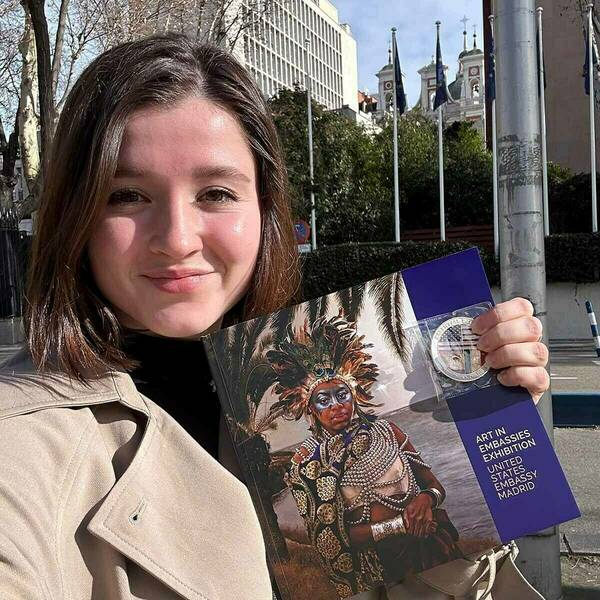Raleigh Kuipers ’25 is a global affairs and Spanish double major with minors in civil and human rights and European studies. During winter break of the 23-24 academic year, she traveled to Spain with help from a Nanovic Institute undergraduate grant. Her research and experiences in Madrid and Barcelona will be an important component of her ongoing research project on feminist foreign policy.

I came across the term “feminist foreign policy” in a New York Times opinion essay written by Lyric Thompson, the chief executive of the Feminist Foreign Policy Collaborative, an organization that works to advance these policies in the United States and globally.
I was immediately intrigued—what does it mean for a foreign policy to be feminist? How do these policies work? What impact does a feminist foreign policy (FFP) have on its country and the rest of the world?
The first FFP was implemented by Sweden in 2014, and by 2024, 16 countries have implemented explicitly feminist foreign policies or announced that they will do so.
The Feminist Foreign Policy Collaborative defines the term as:
“(…) the policy of a state that defines its interactions with other states, as well as movements and other non-state actors, in a manner that prioritizes peace, gender equality and environmental integrity; enshrines, promotes, and protects the human rights of all; seeks to disrupt colonial, racist, patriarchal and male-dominated power structures; and allocates significant resources, including research, to achieve that vision. Feminist foreign policy is coherent in its approach across all of its levers of influence, anchored by the exercise of those values at home and co-created with feminist activists, groups, and movements, at home and abroad.”
These policies seek to promote gender equity both domestically and globally, yet they also go beyond that goal to address broad issues such as climate change, patriarchal structures, and human rights violations, recognizing that these are interconnected problems that require interconnected solutions. Within the countries that currently have these policies, there is also variation in specific focus: for example, Colombia’s FFP is especially pacifist, Germany focuses more on digital equality, and Argentina emphasizes trans feminism.
Exploring how FFPs address intersectionality
These policies seek to promote gender equity both domestically and globally, yet they also go beyond that goal to address broad issues such as climate change, patriarchal structures, and human rights violations, recognizing that these are interconnected problems that require interconnected solutions.
Contrary to what the name might suggest, many countries explicitly frame their policies as working to benefit everyone—regardless of gender identity—and stress the importance of taking intersectional identities into account. I became interested in how various FFPs address intersectionality and how effective they are in improving the lives of people of various gender identities, racial and cultural minorities, and different immigration statuses. I wanted to learn about FFPs in various countries to learn more about which ones are the most effective in achieving their goals, how countries with these policies collaborate internationally, and what an explicitly feminist foreign policy in my home country, the U.S., could be.
I began my research with a Nanovic Institute grant to Spain for three weeks, traveling to Madrid and Barcelona, where I conducted archival research and interviews with experts in the field. Through my reading and conversations, I hoped to begin to understand the general situation of women in Spain, how the country frames and implements its FFP, and how (and to what extent) it takes into account the diversity of women and the LGBTQ+ community.

While in Madrid, I focused on the FFP itself: how the government announced it, how it was formulated, and how it is currently implemented. I also had the incredible opportunity to meet with Ambassador Julissa Reynoso, the first woman—and Black person—to be the U.S. ambassador to Spain. Before her, there had been 80 men in the role. Among other things, we discussed her experiences as the first woman to serve as ambassador, her previous work with the Gender Policy Council launched by the Biden-Harris Administration, and the U.S. National Strategy on Gender Equity and Equality.
In Barcelona, I focused specifically on how Spain’s government and FFP take into account—and sometimes fail to take into account—the unique experiences of its cultural and linguistic minorities in places like Catalonia. In addition to learning about issues specifically related to Spain’s FFP, I also focused on the feminist approach taken by political parties in the region such as the Candidatura d’Unitat Popular-Crida Constituent, a coalition that centers feminism, socialism, and Catalonian independence in its politics. I learned about the experiences of racial minorities in the region and the discrimination against Catalan-speaking people in Spain. I supplemented this research with a trip to the Museu de l'Art Prohibit which taught me about how art that includes “radical” political and social commentary—especially commentary on female sexuality and liberation—is censured throughout the world.
An ongoing project: Future research plans

This research has prepared me for the summer of 2024, when I plan to continue researching FFPs in Chile, Argentina, and Mexico with funding from the Obama-Chesky Voyager Scholarship. I am interested to see what I learn, how these policies can be compared, and what steps I can take to promote the adoption of an FFP in the U.S.